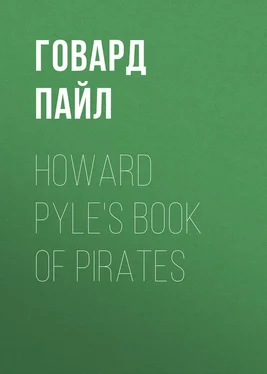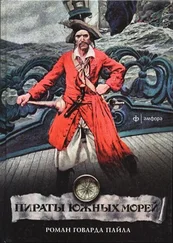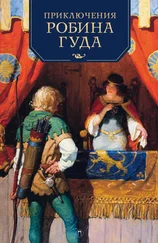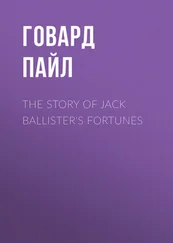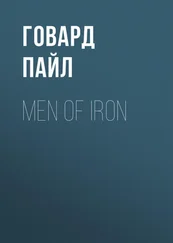Говард Пайл - Howard Pyle's Book of Pirates
Здесь есть возможность читать онлайн «Говард Пайл - Howard Pyle's Book of Pirates» — ознакомительный отрывок электронной книги совершенно бесплатно, а после прочтения отрывка купить полную версию. В некоторых случаях можно слушать аудио, скачать через торрент в формате fb2 и присутствует краткое содержание. Издательство: Иностранный паблик, Жанр: foreign_antique, foreign_prose, foreign_sf, на английском языке. Описание произведения, (предисловие) а так же отзывы посетителей доступны на портале библиотеки ЛибКат.
- Название:Howard Pyle's Book of Pirates
- Автор:
- Издательство:Иностранный паблик
- Жанр:
- Год:неизвестен
- ISBN:нет данных
- Рейтинг книги:4 / 5. Голосов: 1
-
Избранное:Добавить в избранное
- Отзывы:
-
Ваша оценка:
- 80
- 1
- 2
- 3
- 4
- 5
Howard Pyle's Book of Pirates: краткое содержание, описание и аннотация
Предлагаем к чтению аннотацию, описание, краткое содержание или предисловие (зависит от того, что написал сам автор книги «Howard Pyle's Book of Pirates»). Если вы не нашли необходимую информацию о книге — напишите в комментариях, мы постараемся отыскать её.
Howard Pyle's Book of Pirates — читать онлайн ознакомительный отрывок
Ниже представлен текст книги, разбитый по страницам. Система сохранения места последней прочитанной страницы, позволяет с удобством читать онлайн бесплатно книгу «Howard Pyle's Book of Pirates», без необходимости каждый раз заново искать на чём Вы остановились. Поставьте закладку, и сможете в любой момент перейти на страницу, на которой закончили чтение.
Интервал:
Закладка:
When it became known abroad that the great Captain Morgan was about undertaking an adventure that was to eclipse all that was ever done before, great numbers came flocking to his standard, until he had gathered together an army of two thousand or more desperadoes and pirates wherewith to prosecute his adventure, albeit the venture itself was kept a total secret from everyone. Port Couillon, in the island of Hispaniola, over against the Ile de la Vache, was the place of muster, and thither the motley band gathered from all quarters. Provisions had been plundered from the mainland wherever they could be obtained, and by the 24th of October, 1670 (O. S.), everything was in readiness.
The island of Saint Catharine, as it may be remembered, was at one time captured by Mansvelt, Morgan's master in his trade of piracy. It had been retaken by the Spaniards, and was now thoroughly fortified by them. Almost the first attempt that Morgan had made as a master pirate was the retaking of Saint Catharine's Isle. In that undertaking he had failed; but now, as there was an absolute need of some such place as a base of operations, he determined that the place must be taken. And it was taken.
The Spaniards, during the time of their possession, had fortified it most thoroughly and completely, and had the governor thereof been as brave as he who met his death in the castle of Porto Bello, there might have been a different tale to tell. As it was, he surrendered it in a most cowardly fashion, merely stipulating that there should be a sham attack by the buccaneers, whereby his credit might be saved. And so Saint Catharine was won.
The next step to be taken was the capture of the castle of Chagres, which guarded the mouth of the river of that name, up which river the buccaneers would be compelled to transport their troops and provisions for the attack upon the city of Panama. This adventure was undertaken by four hundred picked men under command of Captain Morgan himself.
The castle of Chagres, known as San Lorenzo by the Spaniards, stood upon the top of an abrupt rock at the mouth of the river, and was one of the strongest fortresses for its size in all of the West Indies. This stronghold Morgan must have if he ever hoped to win Panama.
The attack of the castle and the defense of it were equally fierce, bloody, and desperate. Again and again the buccaneers assaulted, and again and again they were beaten back. So the morning came, and it seemed as though the pirates had been baffled this time. But just at this juncture the thatch of palm leaves on the roofs of some of the buildings inside the fortifications took fire, a conflagration followed, which caused the explosion of one of the magazines, and in the paralysis of terror that followed, the pirates forced their way into the fortifications, and the castle was won. Most of the Spaniards flung themselves from the castle walls into the river or upon the rocks beneath, preferring death to capture and possible torture; many who were left were put to the sword, and some few were spared and held as prisoners.
So fell the castle of Chagres, and nothing now lay between the buccaneers and the city of Panama but the intervening and trackless forests.
And now the name of the town whose doom was sealed was no secret.
Up the river of Chagres went Capt. Henry Morgan and twelve hundred men, packed closely in their canoes; they never stopped, saving now and then to rest their stiffened legs, until they had come to a place known as Cruz de San Juan Gallego, where they were compelled to leave their boats on account of the shallowness of the water.
Leaving a guard of one hundred and sixty men to protect their boats as a place of refuge in case they should be worsted before Panama, they turned and plunged into the wilderness before them.
There a more powerful foe awaited them than a host of Spaniards with match, powder, and lead – starvation. They met but little or no opposition in their progress; but wherever they turned they found every fiber of meat, every grain of maize, every ounce of bread or meal, swept away or destroyed utterly before them. Even when the buccaneers had successfully overcome an ambuscade or an attack, and had sent the Spaniards flying, the fugitives took the time to strip their dead comrades of every grain of food in their leathern sacks, leaving nothing but the empty bags.
Says the narrator of these events, himself one of the expedition, "They afterward fell to eating those leathern bags, as affording something to the ferment of their stomachs."
Ten days they struggled through this bitter privation, doggedly forcing their way onward, faint with hunger and haggard with weakness and fever. Then, from the high hill and over the tops of the forest trees, they saw the steeples of Panama, and nothing remained between them and their goal but the fighting of four Spaniards to every one of them – a simple thing which they had done over and over again.
Down they poured upon Panama, and out came the Spaniards to meet them; four hundred horse, two thousand five hundred foot, and two thousand wild bulls which had been herded together to be driven over the buccaneers so that their ranks might be disordered and broken. The buccaneers were only eight hundred strong; the others had either fallen in battle or had dropped along the dreary pathway through the wilderness; but in the space of two hours the Spaniards were flying madly over the plain, minus six hundred who lay dead or dying behind them.
As for the bulls, as many of them as were shot served as food there and then for the half-famished pirates, for the buccaneers were never more at home than in the slaughter of cattle.
Then they marched toward the city. Three hours' more fighting and they were in the streets, howling, yelling, plundering, gorging, dram-drinking, and giving full vent to all the vile and nameless lusts that burned in their hearts like a hell of fire. And now followed the usual sequence of events – rapine, cruelty, and extortion; only this time there was no town to ransom, for Morgan had given orders that it should be destroyed. The torch was set to it, and Panama, one of the greatest cities in the New World, was swept from the face of the earth. Why the deed was done, no man but Morgan could tell. Perhaps it was that all the secret hiding places for treasure might be brought to light; but whatever the reason was, it lay hidden in the breast of the great buccaneer himself. For three weeks Morgan and his men abode in this dreadful place; and they marched away with one hundred and seventy-five beasts of burden loaded with treasures of gold and silver and jewels, besides great quantities of merchandise, and six hundred prisoners held for ransom.
Whatever became of all that vast wealth, and what it amounted to, no man but Morgan ever knew, for when a division was made it was found that there was only two hundred pieces of eight to each man .
When this dividend was declared, a howl of execration went up, under which even Capt. Henry Morgan quailed. At night he and four other commanders slipped their cables and ran out to sea, and it was said that these divided the greater part of the booty among themselves. But the wealth plundered at Panama could hardly have fallen short of a million and a half of dollars. Computing it at this reasonable figure, the various prizes won by Henry Morgan in the West Indies would stand as follows: Panama, $1,500,000; Porto Bello, $800,000; Puerto del Principe, $700,000; Maracaibo and Gibraltar, $400,000; various piracies, $250,000 – making a grand total of $3,650,000 as the vast harvest of plunder. With this fabulous wealth, wrenched from the Spaniards by means of the rack and the cord, and pilfered from his companions by the meanest of thieving, Capt. Henry Morgan retired from business, honored of all, rendered famous by his deeds, knighted by the good King Charles II, and finally appointed governor of the rich island of Jamaica.
Читать дальшеИнтервал:
Закладка:
Похожие книги на «Howard Pyle's Book of Pirates»
Представляем Вашему вниманию похожие книги на «Howard Pyle's Book of Pirates» списком для выбора. Мы отобрали схожую по названию и смыслу литературу в надежде предоставить читателям больше вариантов отыскать новые, интересные, ещё непрочитанные произведения.
Обсуждение, отзывы о книге «Howard Pyle's Book of Pirates» и просто собственные мнения читателей. Оставьте ваши комментарии, напишите, что Вы думаете о произведении, его смысле или главных героях. Укажите что конкретно понравилось, а что нет, и почему Вы так считаете.
